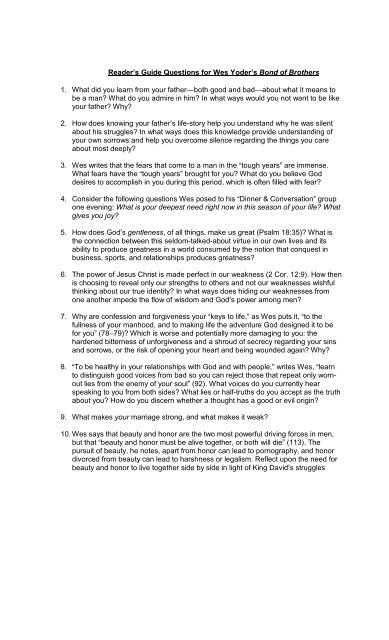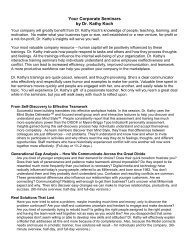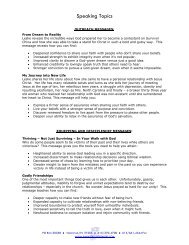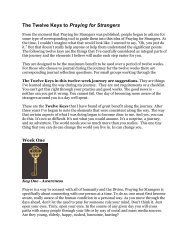Reader's Study Guide - Ambassador Speakers Bureau
Reader's Study Guide - Ambassador Speakers Bureau
Reader's Study Guide - Ambassador Speakers Bureau
Create successful ePaper yourself
Turn your PDF publications into a flip-book with our unique Google optimized e-Paper software.
Reader’s <strong>Guide</strong> Questions for Wes Yoder’s Bond of Brothers<br />
1. What did you learn from your fatherboth good and badabout what it means to<br />
be a man? What do you admire in him? In what ways would you not want to be like<br />
your father? Why?<br />
2. How does knowing your fathers life-story help you understand why he was silent<br />
about his struggles? In what ways does this knowledge provide understanding of<br />
your own sorrows and help you overcome silence regarding the things you care<br />
about most deeply?<br />
3. Wes writes that the fears that come to a man in the tough years are immense.<br />
What fears have the tough years brought for you? What do you believe God<br />
desires to accomplish in you during this period, which is often filled with fear?<br />
4. Consider the following questions Wes posed to his Dinner & Conversation group<br />
one evening: What is your deepest need right now in this season of your life? What<br />
gives you joy?<br />
5. How does Gods gentleness, of all things, make us great (Psalm 18:35)? What is<br />
the connection between this seldom-talked-about virtue in our own lives and its<br />
ability to produce greatness in a world consumed by the notion that conquest in<br />
business, sports, and relationships produces greatness?<br />
6. The power of Jesus Christ is made perfect in our weakness (2 Cor. 12:9). How then<br />
is choosing to reveal only our strengths to others and not our weaknesses wishful<br />
thinking about our true identity? In what ways does hiding our weaknesses from<br />
one another impede the flow of wisdom and Gods power among men?<br />
7. Why are confession and forgiveness your keys to life, as Wes puts it, to the<br />
fullness of your manhood, and to making life the adventure God designed it to be<br />
for you (7879)? Which is worse and potentially more damaging to you: the<br />
hardened bitterness of unforgiveness and a shroud of secrecy regarding your sins<br />
and sorrows, or the risk of opening your heart and being wounded again? Why?<br />
8. To be healthy in your relationships with God and with people, writes Wes, learn<br />
to distinguish good voices from bad so you can reject those that repeat only wornout<br />
lies from the enemy of your soul (92). What voices do you currently hear<br />
speaking to you from both sides? What lies or half-truths do you accept as the truth<br />
about you? How do you discern whether a thought has a good or evil origin?<br />
9. What makes your marriage strong, and what makes it weak?<br />
10. Wes says that beauty and honor are the two most powerful driving forces in men,<br />
but that beauty and honor must be alive together, or both will die (113). The<br />
pursuit of beauty, he notes, apart from honor can lead to pornography, and honor<br />
divorced from beauty can lead to harshness or legalism. Reflect upon the need for<br />
beauty and honor to live together side by side in light of King Davids struggles
throughout his life to bring both together. As a result of your struggles, in what ways<br />
do you now share (or not yet share) Davids one desire to gaze on the beauty of<br />
the Lord?<br />
11. How has pornography affected your view of women?<br />
12. The act of homemaking is usually spoken of as a womans responsibility, but how<br />
do you see your role as a man in making your home a place of both beauty and<br />
honor? What do you want your home to be in the next twenty years?<br />
13. What have you learned from the hardships youve been through? Has the value of<br />
what you discovered surpassed the cost of your sorrows? What does it mean to<br />
allow Jesusthe Man of Sorrows, acquainted with griefinto your sorrows and to<br />
enter, as the apostle Paul puts it, into the fellowship of sharing in his sufferings<br />
(Phil. 3:10)?<br />
14. What is the greatest sorrow of your life? What is your greatest fear?<br />
15. Reflecting on his disappointing experience with an accountability group, Wes<br />
writes, we did not live out of our weaknesses or understand authenticity. Ideas<br />
about church and Jesus flourished, but Jesus was not the center of our life<br />
together (142143). What does it mean for a group of men to center their shared<br />
life together on Jesus? How are you living this out in your relationships with other<br />
men today?<br />
16. Wes writes, A man who is unsure of love acts in anger and must lose himself in a<br />
cause or a set of rules to find a sense of identity (156). Do you agree? Why or why<br />
not? Do you believe you are deeply loved by God? Why or why not?<br />
17. How has placing a high value on performance and results caused you to<br />
misconstrue Jesus statement to be perfect, as your heavenly Father is perfect?<br />
How have your performance-oriented expectations affected the way you view the<br />
body of Christ and the way you consequently relate to other men within the church?<br />
18. In what ways does your awareness of and cooperation with Gods Spirit, who is<br />
alive and at work inside you, transform the way you relate with others in your<br />
journey as a Christ-man?<br />
19. Make a list of things that might be evidence of something lacking in manhood. Be<br />
honest about which item on the list most accurately describes your struggle.<br />
20. With a group of friends, discuss what characteristics describe authentic manhood.<br />
21. Men are shaped by what they love. What do you love?






